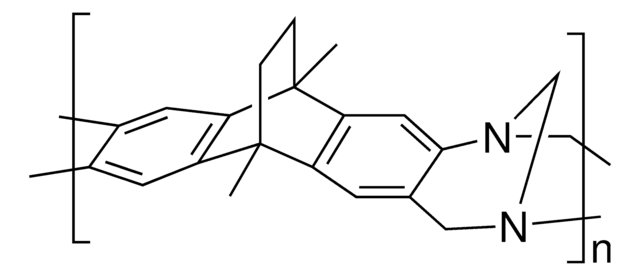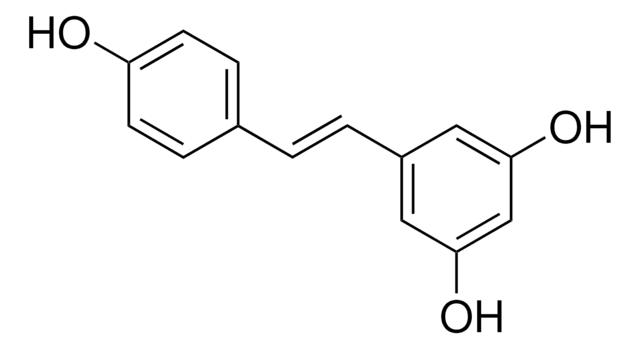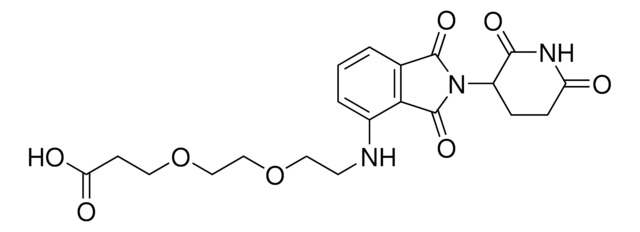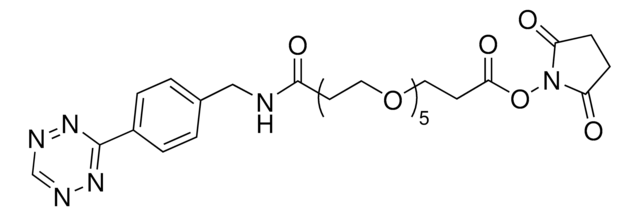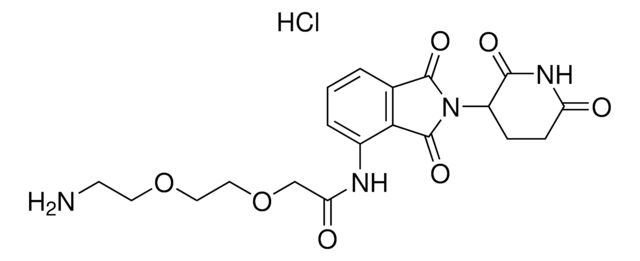930512
VH 032 amide-PEG3-acid
≥95.0%
동의어(들):
(S, R, S)-AHPC-PEG3-acid, 3-Dimethyl-1-oxobutan-2-yl]carbamoyl}ethoxy)ethoxy]ethoxy}propanoic acid, 3-{2 -[2-(2-{[(2S)-1-[(2S,4R)-4-Hydroxy-2-({[4-(4-methyl-1,3-thiazol-5-yl)phenyl]methyl}carbamoyl)pyrrolidin-1-yl]-3, N-[3-[2-[2-(2-Carboxyethoxy)ethoxy]ethoxy]-1-oxopropyl]-3-methyl-L-valyl-4-hydroxy-N-[[4-(4-methyl-5-thiazolyl)phenyl]methyl]-, L-Prolinamide
로그인조직 및 계약 가격 보기
모든 사진(1)
About This Item
실험식(Hill 표기법):
C32H46N4O9S
CAS Number:
Molecular Weight:
662.79
MDL number:
UNSPSC 코드:
12352106
추천 제품
ligand
VH032
Quality Level
분석
≥95.0%
양식
powder
작용기
carboxylic acid
저장 온도
2-8°C
SMILES string
OC(CCOCCOCCOCCC(N[C@@H](C(C)(C)C)C(N1[C@@H](C[C@H](C1)O)C(NCC2=CC=C(C3=C(N=CS3)C)C=C2)=O)=O)=O)=O
애플리케이션
VH 032 amide-PEG3-acid is a functionalized von-Hippel-Lindau (VHL) ligand with a terminal carboxyl group, allowing rapid conjugation of amine containing linkers. A basic building block for development of a protein degrader library.
Technology Spotlight: Degrader Building Blocks for Targeted Protein Degradation
Protein Degrader Building Blocks
Automate your VHL-PEG based PROTACs with Synple Automated Synthesis Platform (SYNPLE-SC002)
Technology Spotlight: Degrader Building Blocks for Targeted Protein Degradation
Protein Degrader Building Blocks
Automate your VHL-PEG based PROTACs with Synple Automated Synthesis Platform (SYNPLE-SC002)
기타 정보
Targeted Protein Degradation by Small Molecules
Destruction of DNA-Binding Proteins by Programmable Oligonucleotide PROTAC (O′PROTAC): Effective Targeting of LEF1 and ERG
Small-Molecule PROTACS: New Approaches to Protein Degradation
Targeted Protein Degradation: from Chemical Biology to Drug Discovery
Impact of linker length on the activity of PROTACs
Destruction of DNA-Binding Proteins by Programmable Oligonucleotide PROTAC (O′PROTAC): Effective Targeting of LEF1 and ERG
Small-Molecule PROTACS: New Approaches to Protein Degradation
Targeted Protein Degradation: from Chemical Biology to Drug Discovery
Impact of linker length on the activity of PROTACs
Storage Class Code
11 - Combustible Solids
WGK
WGK 3
Flash Point (°F)
Not applicable
Flash Point (°C)
Not applicable
가장 최신 버전 중 하나를 선택하세요:
Daniel P Bondeson et al.
Annual review of pharmacology and toxicology, 57, 107-123 (2016-10-13)
Protein homeostasis networks are highly regulated systems responsible for maintaining the health and productivity of cells. Whereas therapeutics have been developed to disrupt protein homeostasis, more recently identified techniques have been used to repurpose homeostatic networks to effect degradation of
자사의 과학자팀은 생명 과학, 재료 과학, 화학 합성, 크로마토그래피, 분석 및 기타 많은 영역을 포함한 모든 과학 분야에 경험이 있습니다..
고객지원팀으로 연락바랍니다.